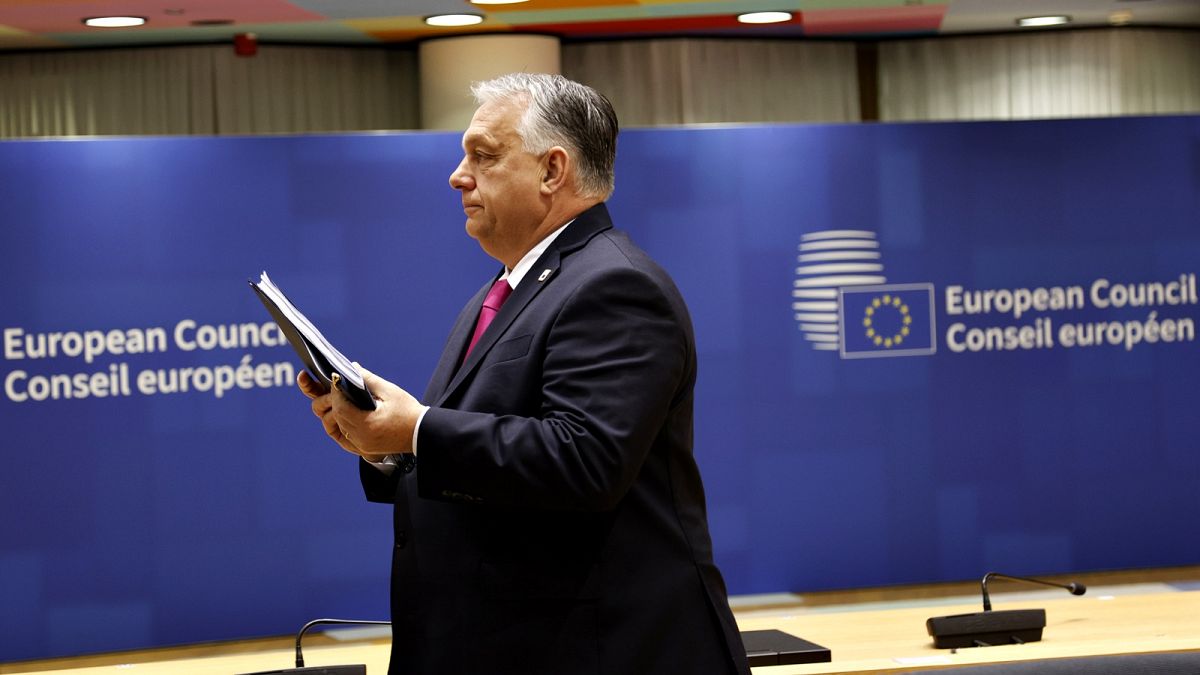The first round of talks between the EU and Ukraine will take place on 25 June, after member states endorsed the overall framework for negotiations.
Ukraine’s ambitions to join the European Union could be brought to a six-month standstill as soon as Hungary takes over the Council’s rotating presidency.
From 1 July to 31 December, Viktor Orbán’s government will set the weekly agenda and chair ministerial meetings in Brussels, effectively deciding which topics are put at the top of the list and those sent to the bottom.
The official slogan of the presidency will be “Make Europe Great Again,” a nod to Donald Trump.
The prospect has caused unease among diplomats, who fear Orbán will exploit the privileged position to advance its nationalist, hard-right views. In particular, the bloc’s Ukraine policy – which the premier has vocally contested and, at times, blocked by wielding his veto – is considered the most at risk of being derailed.
On Tuesday, as Budapest unveiled the official programme for the presidency, these fears appeared to be validated: János Bóka, Hungary’s Minister for European Affairs, made it clear his country would not help Kyiv open any of the 35 chapters that make up the six thematic clusters of membership negotiations.
“According to my expectations, during the Hungarian presidency, the issue of opening chapters won’t be raised at all,” Bóka said.
The 21-page programme makes several allusions to Ukraine concerning the economy, territorial integrity, reconstruction, security implications, refugees, war crimes and free roaming, but not in the context of enlargement.
“The enlargement process must contribute substantially to the improvement of the situation of national minorities,” it reads. (Orbán has repeatedly complained about the lack of protection for the Hungarian minority in Ukraine, which Kyiv has addressed by amending legislation on education and minority languages.)
The tone contrasts with that of Belgium, the current holder of the rotating presidency, which strove to advance Ukraine’s accession bid as much as possible.
Last week, Belgium managed to reach the necessary unanimity to approve the negotiating framework for Ukraine and Moldova, which Hungary had blocked.
The breakthrough will allow Belgium to hold the first intergovernmental conference with Ukraine on 25 June. In other words, the first round of talks.
“Excellent news from Brussels,” said Olga Stefanishyna, Ukraine’s deputy prime minister, then. “Moving to the next stage of our accession.”
The momentum, though, will likely be cut short.
Curb your enthusiasm
During Tuesday’s press conference, Bóka said his country would aim to make the enlargement process “merit-based, objective and credible” and to shift the political attention from Ukraine to the Western Balkans.
“What we have seen is that in certain member states (and) institutions there is a kind of enthusiasm for enlargement for, quite clearly, the Eastern trio,” Bóka said, referring to Ukraine, Moldova and Georgia.
“The presidency has set the objective of having some of this enthusiasm spill over into the Western Balkans so that all of them could (be) one step closer to membership.”
Bóka said it would be “realistic” for Serbia, a perennial candidate that has progressively drifted away from EU standards, to open a new cluster of chapters during the Hungarian presidency, while Montenegro should unblock “as many chapters as possible.” A new intergovernmental conference, he added, should be held for North Macedonia and Albania, whose bids advance in parallel.
For Ukraine, Bóka noted, the process could “go on” after the 25 June meeting but this should be done “in the prescribed manner” and only after the European Commission conducts the necessary screening to examine Ukraine’s ability to join the bloc.
He then clarified the opening of new chapters for Kyiv would not be “raised at all” in the forthcoming six months.
Enlargement policy, like foreign affairs, taxation and the common budget, is bound by the principle of unanimity, meaning one single country can arrest a decision agreed upon by the other 26 member states.
Orbán has extensively used the principle to extract concessions and stall agreements, most notoriously on Ukraine and Russia. Hungary is currently preventing the release of €6.6 billion in EU military assistance for Ukraine, a gridlock that started in May last year and shows no signs of being broken any time soon.
Zoltán Kovács, the government’s international spokesperson, has previously refused to rule out using the veto power during the presidency, something that, if it were to happen, would seriously aggravate tensions between Hungary and its peers.
On Tuesday, Bóka vowed the country would act as an “honest broker” and work “loyally.” However, he added, Hungary “represents a very clear European alternative. And this vision of Europe is going to be represented in our work as well.”
Asked about the ongoing debate on EU top jobs, Bóka reaffirmed Hungary’s opposition to Ursula von der Leyen’s re-election as European Commission president but said there were no objections to the candidacies of António Costa (European Council) and Kaja Kallas (High Representative). Leaders are expected to seal the deal on 27 June.

